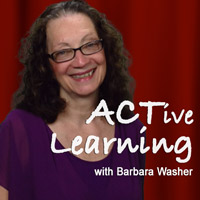| 3 , 4 , 5 | |
| Theater | English Social Studies |
| Grade Level Program | Integration |
| 5 | 45 min |
|
45-60 minute sessions with a culminating grade level Share Number of visits is flexible and are typically held once or twice a week to best integrate with selected Social Studies unit Schedule determined during a pre-planning meeting and based on the needs of the school |
|
| In-School Short Term Residency | |
| All Year | In-School, |
| $10 | 0 |
| yes | In-Person |
|
Handouts, prompts and reference materials based on selected Social Studies Unit and Character Development/Scene Study activities |
|
|
Chart paper or white board Non-lined paper or journal for each student Agreed upon materials or copies Props for informal Sharing, if desired Copy of the selected Social Studies unit or chapter and related text |
|
|
Open space in classroom or multi-purpose space large enough for entire class to participate on their feet simultaneously or spread out to work in small groups A large space or auditorium reserved for Session 4 and Session 5, if sharing with the whole grade level |
|
|
I can use facts and imagination to describe the home, clothing, food, language, job and daily life of a person from another time, place or culture. I can recognize, discuss and demonstrate at least 2 similarities and 2 differences between life in another historical period or culture and our life today. I can work with peers to create and perform an original scene or theatre piece representing characters from another time, place or culture. |
|
|
Walk in their Shoes. Live through their Eyes. Teachers may select any Social Studies unit or topic, possibly enhanced by incorporating a related Language Arts text. Collaboration with the Teaching Artist ensures the alignment of specific Drama activities with the selected content to fully support student learning. (See Additional Notes for examples) The residency typically consists of 5 sessions with the possibility of related teacher directed classwork in between. Each meeting incorporates a Warm-up, a Brief Review, 1-2 Drama activities, moments of Self-reflection, a Summary, and a Preview. Session 1 introduces students to Drama and builds comfort and confidence by working simultaneously "Alone Together", developing focus and inspiring creativity. Sharing what they have learned about the topic begins the exploration. Sessions 2 and 3 intertwine research and imagination to deepen understanding of the actions and motivations of people throughout history or in other cultures. Based on guided reading of text and images, each student visualizes a character's personal life, relationships, occupation, and events within their community. Children communicate insights through discussion, writing (letters/journal entries/scripts/poetry), and /or drawing (floor plans of homes or workplaces). Session 4 breathes life into the work as students improvise situations and speak in the voice of their character to create a unique sharing of the connections made. Session 5 empowers students to solidify their learning by presenting to others, reflecting on their own work, and giving/receiving feedback. Acting exercises based on character and setting bring fresh personal insights, as students experience the world from the perspective of another time, place, and culture. Honoring individual exploration assures equal participation throughout the creative process. Handouts, prompts and activities can provide powerful support to a range of topics throughout the year. |
|
|
Examples:
Students explore Mexican/American Culture and Immigration by creating scenes from the text Esperanza Rising by Pam Munoz Ryan. Students delve into the lives and work of people living in Colonial America by demonstrating their trades and the interdependence within the village. Choose your own topic or select from the units previously created below: Immigration - Explore leaving a country of origin, experiencing the journey, and arriving in America (if desired, comparing the past to the present) Colonial America - Imagine settling in a new land by portraying village life, trades, and language of the period Revolutionary War - Enact events leading up to the war and its effects on different segments of the population Westward Expansion - Experience moving west, predicting hardships and brainstorming solutions *The Teaching Artist can utilize texts from the current curriculum and/or supply additional resources for any unit. *Activities can be adapted to build understanding of people from various geographical areas and cultures. Potential extended projects: 5th graders expanded their final Share of scenes from Esperanza Rising to create a movie by adding simple props, costumes and set pieces and choosing backgrounds for filming with a green screen. *Teachers noted, "even the most reserved children stepped up to write scenes and perform on camera." Students were proud of their "individual contributions to developing characters and the teamwork involved in producing their own movie." An entire grade created one colonial village to be visited by other grades. They chose costumes/props, made signs/backgrounds, learned language of the time and incorporated period music/dance to demonstrate their shops/trades and village life. *All ACTive Learning Through Drama programs have been developed and implemented by a professional Theatre Educator in collaboration with Classroom Teachers and Arts Specialists. |
|
|
1-3 are welcome to assist in the classroom, if the teacher desires. Parents, guardians and administrators could watch the informal Share in Session 5. |
|
Grade 3 |
||||
|
||||
Grade 4 |
||||
|
||||
Grade 5 |
||||
|

